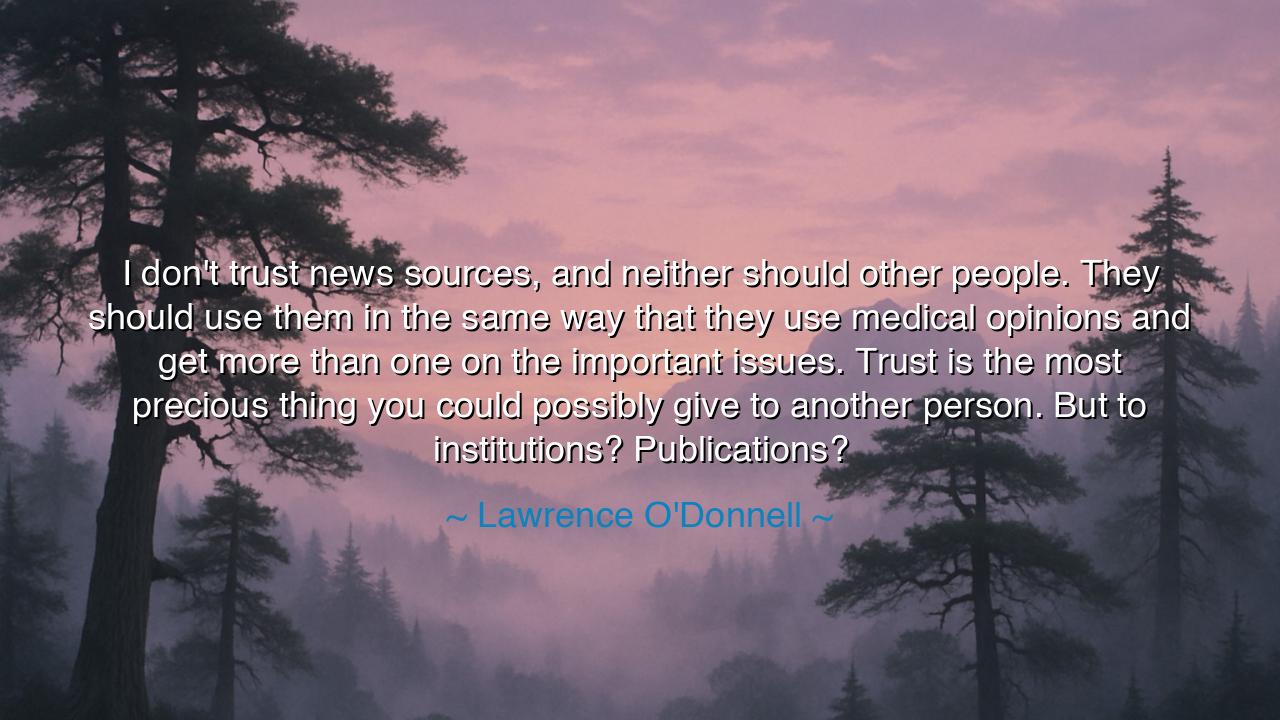
I don't trust news sources, and neither should other people. They
I don't trust news sources, and neither should other people. They should use them in the same way that they use medical opinions and get more than one on the important issues. Trust is the most precious thing you could possibly give to another person. But to institutions? Publications?






In the words of Lawrence O’Donnell, “I don't trust news sources, and neither should other people. They should use them in the same way that they use medical opinions and get more than one on the important issues. Trust is the most precious thing you could possibly give to another person. But to institutions? Publications?” — there echoes a wisdom that transcends modern cynicism. It is not the voice of bitterness, but of awakening. O’Donnell speaks not against knowledge, but against blind faith; not against the messenger, but against the surrender of discernment. His is a call to intellectual vigilance, a reminder that truth, like health, must be pursued actively — with courage, humility, and care.
The origin of this quote lies in a time when information has become both abundant and polluted. O’Donnell, a journalist and thinker shaped by decades in media, understands that the age of the printing press has given way to the age of algorithms, where every voice, noble or deceitful, clamors for attention. He likens news to medical opinions, for both require interpretation, comparison, and verification. Just as a wise patient does not accept a single diagnosis as final, so too should a wise citizen not grant ultimate authority to one news outlet, one ideology, one narrative. For in the marketplace of voices, truth is not given — it must be earned through inquiry.
To the ancients, the concept of trust was sacred, bound not to institutions but to virtue. The philosopher Seneca once warned that confidence placed in the unworthy becomes the ruin of the soul. Trust, he said, should be bestowed only upon those who have proven themselves by their deeds. O’Donnell’s words carry that same ancestral warning: do not cast your faith before corporations or governments, for these are not beings of conscience, but machines of power and profit. Trust is personal, not mechanical; it belongs to the realm of honor, not headlines. To give it carelessly is to hand over your sight to another’s hands.
History is filled with examples that affirm his caution. In the early 20th century, Joseph Goebbels, the propagandist of Nazi Germany, mastered the art of shaping public perception through controlled news. Millions believed lies because they mistook repetition for truth, authority for wisdom. The tragedy that followed was born not only of malice but of unquestioned trust — a faith misplaced in institutions that sought to dominate, not enlighten. O’Donnell’s warning, though delivered in a gentler time, flows from the same river of awareness: that a society that ceases to question its storytellers becomes enslaved by them.
Yet his words are not a rejection of journalism, but a reclamation of responsibility. Just as doctors labor to heal, so too do journalists strive to reveal. But both can err, and both can be swayed by their own human limitations — ambition, fear, bias, or fatigue. Thus, O’Donnell urges us to become active participants in truth, not passive consumers. “Get more than one,” he says — meaning: compare, reflect, discern. Listen not only to the loudest voice, but to the quiet one that makes you think. In this way, you honor not the institution, but the spirit of truth itself.
There is also an undercurrent of moral philosophy in his words: that trust is sacred currency, not to be spent cheaply. When O’Donnell says, “Trust is the most precious thing you could possibly give,” he speaks as an elder might to his disciples. In a world where everything can be bought, trust cannot. It is the final measure of integrity, and once lost, it cannot easily be restored. Institutions, he implies, cannot love you back, cannot weep for your betrayal — but a person can. Therefore, invest your faith in people of conscience, not faceless systems that crave your belief but not your understanding.
From this reflection arises a profound lesson for all seekers of truth: question deeply, trust slowly, and remain awake. In every age, the wise have known that truth is not a possession but a pursuit — one that demands patience, courage, and the humility to be uncertain. Let the modern reader, then, follow O’Donnell’s counsel as a discipline of the mind. Read broadly. Verify relentlessly. Protect your faith as you would your life, for in the age of deception, to think clearly is an act of rebellion.
And when you must give your trust — give it not to the tower, but to the torch-bearer; not to the name, but to the soul that stands behind it. For as Lawrence O’Donnell reminds us, trust misplaced can enslave, but trust earned can enlighten — and in this, the fate of every civilization has always depended.






AAdministratorAdministrator
Welcome, honored guests. Please leave a comment, we will respond soon